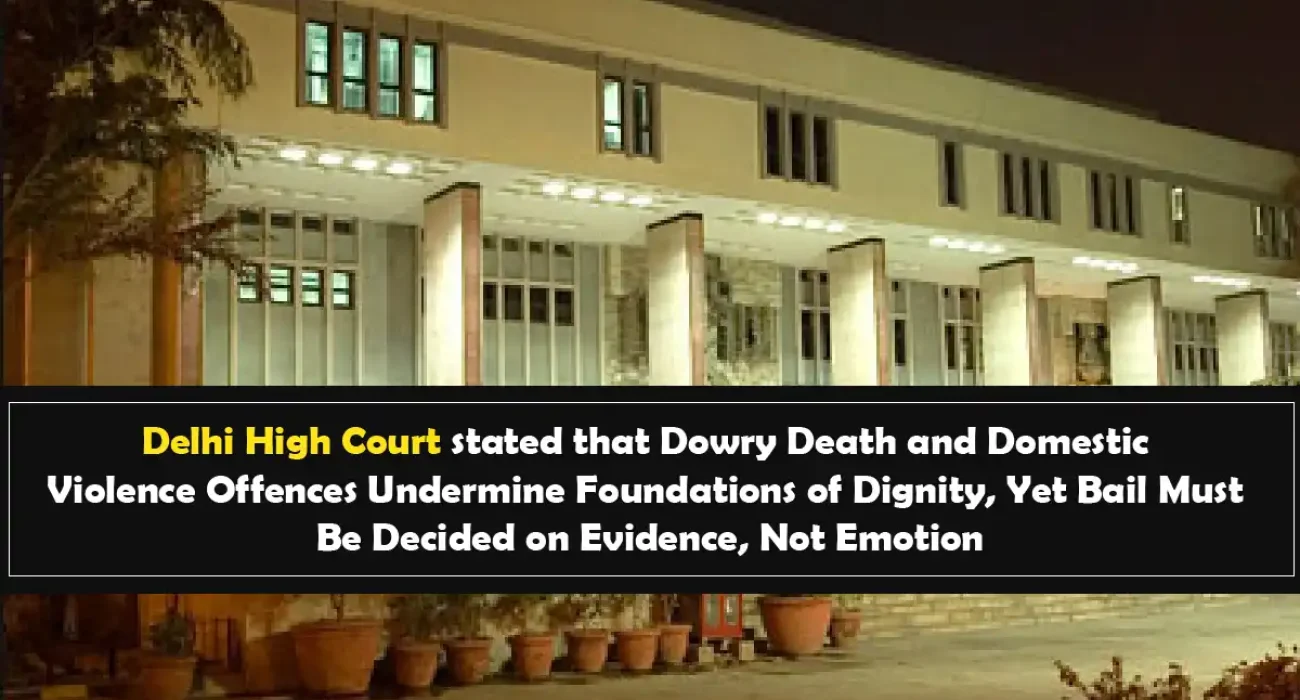

Table of Contents
ToggleThe case pertains to the unnatural death of X, a 24-year-old woman who was found hanging in the bathroom of her matrimonial home on 29th November 2023. She had been married to the applicant, Karanjeet Singh, for less than a year. Her death was declared “brought dead” at GTB Hospital, and the FIR was registered under Sections 498A/304B/34 IPC. The Crime Team seized evidence including a chunni and broken tiles, and a post-mortem revealed the cause of death to be ante mortem hanging. The deceased’s parents alleged she had been subjected to dowry demands and abuse, and that her marriage was never consummated. They also alleged that the applicant had an illicit relationship with his sister-in-law. Based on their statements, arrests were made including of the applicant, his father, brother, and sister-in-law. The mobile phones of the applicant and sister-in-law were seized, revealing WhatsApp chats with vulgar language directed at the deceased. Despite the gravity of allegations, there was no complaint of harassment filed during the deceased’s lifetime. The final chargesheet was filed on 24th February 2024.
The applicant contended that he is innocent and has been falsely implicated due to ulterior motives harboured by the deceased’s mother. He argued that the investigation has been completed, charges framed, and over one year of judicial custody undergone, while the trial may continue for an indefinite period. On parity grounds, he highlighted that co-accused sister-in-law had already been granted bail. He further asserted his need for urgent medical intervention due to a worsening kidney stone condition that cannot be treated in jail. The applicant stressed the lack of any prior complaint or contemporaneous evidence of dowry demand, asserting that such allegations surfaced only posthumously. He noted that the mother of the deceased had admitted during a previous bail hearing that no dowry was given at the time of marriage. He also claimed that he was at work during the time of the incident and had rushed home upon learning of it. Lastly, he pointed out inconsistencies between the original statements and testimonies presented later by the deceased’s family.
The State, represented the complainant, and strongly opposed the bail application. They emphasized that the death occurred under suspicious circumstances within seven years of marriage, invoking a presumption of guilt under Section 304B IPC and Section 113B of the Indian Evidence Act. The prosecution maintained that the deceased was subjected to systematic emotional and physical abuse, not limited to dowry demands but also including denial of marital rights and humiliation. WhatsApp chats showing vulgar and degrading references to the deceased were cited to support this claim. The complainant’s counsel highlighted that there were repeated allegations of unlawful demands made shortly before the death and insisted that granting bail would undermine the gravity of the charges and risk interference with the trial process.
The Court undertook a detailed examination of the ingredients required to attract Section 304B IPC, including the need to establish that the cruelty or harassment related to dowry occurred “soon before” the death. The Court observed:
“Prima facie, the record does not disclose any immediate or proximate instance of dowry-related cruelty or harassment that could satisfy the threshold of ‘soon before her death’…”
It noted the absence of any specific, recent, or consistent allegations relating to dowry demand immediately prior to the deceased’s demise. It further cited the Supreme Court’s ruling in Kans Raj v. State of Punjab to clarify the importance of a “proximate and live link” between the alleged harassment and the death. The Court also rejected the invocation of Section 306 IPC at this stage, observing:
“This is not a case where the accused… created such circumstances that the deceased was left with no other option except to commit suicide…” — Ramesh Kumar v. State of Chhattisgarh
While allegations of an extra-marital affair were emotionally charged, the Court held that such claims do not independently substantiate cruelty under dowry laws. It referred to Parul v. State (NCT of Delhi) and K.V. Prakash Babu v. State of Karnataka to reiterate that an extra-marital relationship, without more, does not amount to harassment “soon before death” for Section 304B IPC to apply. The Court also highlighted the cordial relations between the families, noting that the deceased’s mother had recently attended a birthday celebration at the matrimonial home, which weakened the narrative of consistent hostility.
In conclusion, the Delhi High Court found that the applicant had made out a prima facie case for the grant of bail, particularly in light of the absence of recent dowry-related cruelty, the completed investigation, and the extended judicial custody. The Court ordered the release of the applicant on bail upon furnishing a personal bond of ₹50,000 with two sureties, subject to conditions including mandatory appearance in court, restriction on international travel, cooperation with the investigation officer, and prohibition from contacting prosecution witnesses. It also warned that any misconduct or new FIR could result in cancellation of bail. The Court clarified that:
“Any observations made in the present order are for the purpose of deciding the present bail application and should not influence the outcome of the trial.”
Credits: Adv. Deeksha Rai
IAW resources
Browse our help directory